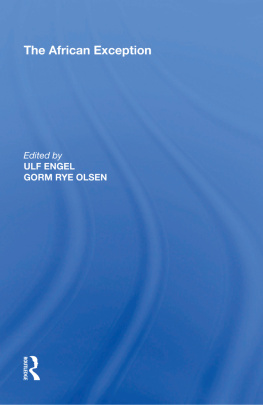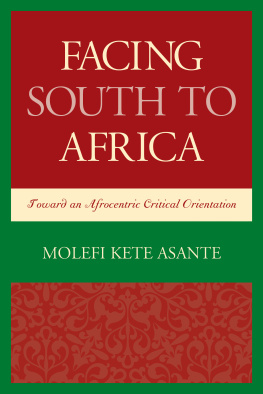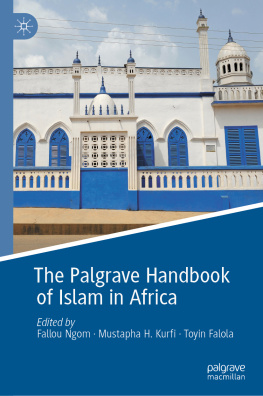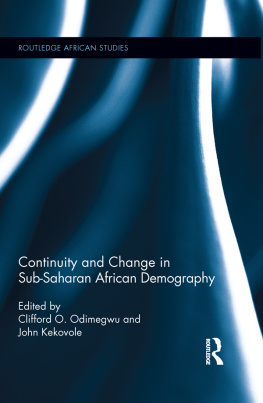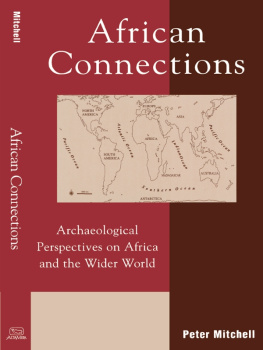The African Experience
The African Experience
An Introduction
Fourth Edition
VINCENT B. KHAPOYA
Oakland University
First published 2013, 2010, 1998, 1994 by Pearson Education, Inc.
Published 2016 by Routledge
2 Park Square, Milton Park, Abingdon, Oxon OX14 4RN
711 Third Avenue, New York, NY, 10017, USA
Routledge is an imprint of the Taylor & Francis Group, an informa business
Copyright 2013, 2010, 1998, 1994 Taylor & Francis. All rights reserved
All rights reserved. No part of this book may be reprinted or reproduced or utilised in any form or by any electronic, mechanical, or other means, now known or hereafter invented, including photocopying and recording, or in any information storage or retrieval system, without permission in writing from the publishers.
Notice:
Product or corporate names may be trademarks or registered trademarks, and are used only for identification and explanation without intent to infringe.
Credits and acknowledgments borrowed from other sources and reproduced, with permission, in this textbook appear on appropriate page within text.
ISBN: 9780205851713 (pbk)
Cover Designer: Karen Noferi
Library of Congress Cataloging-in-Publication Data
Khapoya, Vincent B.
The African experience : an introduction / Vincent B. Khapoya. 4th ed.
p. cm.
Includes bibliographical references and index.
ISBN 978-0-205-85171-3 (alk. paper)
1. AfricaHistory. I. Title.
DT20.K47 2013
960dc23 2011047946
Izzat, Aman Cabral, and Aisha K. Robinson
BRIEF CONTENTS
CONTENTS
CHAPTER 1
Africa: The Continent and Its People
CHAPTER 2
African Traditional Institutions
CHAPTER 3
Political Development in Historic Africa
CHAPTER 4
Colonialism and the African Experience
CHAPTER 5
African Nationalism and the Struggle for Freedom
CHAPTER 6
African Independence: The First Thirty Years
CHAPTER 7
The African Struggle for Democracy and Free Markets
CHAPTER 8
Africa in World Affairs
T he fourth edition of this book is long overdue. I am pleased to be able to update it and to reflect on some of the changes that have occurred since the second edition was published twelve years ago. When I first began to teach an introductory course on Africa, for nearly twenty years, I could not find a textbook that presented Africa in its totality. There were edited books, compilations of chapters written by eight or ten authors, from different disciplines in the humanities and the social sciences. Despite the best efforts of the editors to maintain thematic coherence, my students continued to complain about the unevenness of the material they were reading, in both style and content. I then decided to write this book to meet the need for a text that shows how culture, history, politics, and European imperialism have interacted to produce an Africa that is much more complex and dynamic. In the paragraphs that follow, I will briefly discuss the features of the book, what is new in this edition, and provide summaries of the chapters.
NEW TO THIS EDITION
on languages spoken in African countries has also been updated.
With regard to the use of violence to subjugate Africans who were resisting colonization, additional evidence of German brutality is provided in the form of a recent admission by the German government that what the German soldiers did to the Nama and Herero people in Namibia could probably be described as genocide and the German government was prepared to apologize, but would not consider paying reparations to the descendants of the 65,000 people killed by German soldiers.
Additional discussion of the Arab Spring, in North Africa and Yemen, a term being used to refer to the peoples uprisings in the form of mass demonstrations which have brought down the governments of Tunisia and Egypt, both now being ruled by interim governments while they decide what to do next. The third country, Libya, is still contested six months after the Libyan people took to the streets and took up arms to rid the country of Qaddafi who has been running Libya autocratically for forty-two years. Troops loyal to Qaddafi still hold four towns as of September 2011. Observers expect him and his sons to flee Libya in the next several months.
An update on the African Union (AU), founded in 2002 with high hopes of being more successful and more forceful in articulating and protecting African interests. So far, the AU is struggling financially to maintain troops in Darfur, refuses to declare the killings in Darfur as genocide, and has yet to recognize the interim national council in Libya as the legal representative of the Libyan people. There is still more work to be done.
FEATURES
The book assumes no prior knowledge of Africa. It also does not confine itself to sub-Saharan Africa, so-called Black Africa. Hence, it takes the student from the geography of the continentphysical, political, and demographicto the linguistic classification of the more than 800 major languages spoken on the continent. This is followed by a presentation of traditional institutions and customs, the precolonial history of Africa, the scramble for imperial control of the Africans by European powers. The depth of the colonial experience is illustrated by the fact that only two states (out of the current fifty-four independent nations) were never formally colonized: Ethiopia and Liberia. The introduction of the concept of the civilizing mission is an attempt to explore the cultural reasons for European colonization of Africa and to raise the question, What did the Europeans expect a civilized African to be like once they were done with their mission? African nationalism, which was a response to colonialism, is discussed, as well as the attainment of independence, beginning in the early 1950s. The last three chapters deal with the choices made by the first generation of African leaders in trying to create new nations out of their new sovereign states and to raise the living standards of their people. The first three decades of independence were probably wasted as African leaders experimented with one-party systems and government-controlled (or socialist) economies. With prodding from international institutions like the World Bank and IMF and from major aid donors, African countries have embarked on free-market economies. They have also opened up more democratic space. There are now nearly a dozen countries in AfricaGhana, Botswana, South Africa, Namibia, to name four exampleswhich meet standards of democracy. The book concludes with an examination of the role that Africa has played on the world stage, the African Union (formed in 2002 to replace the Organization of African Unity), the African leaders efforts to take care of their own problems and lessen their dependence on the United States and European countries.
, in the first half, introduces the African continent in terms of geography and demography. Statistics pertaining to population and gross national income (GNI) per person have been updated to 2011. The second half treats in some detail the diversity and convergence of African people in the cultural and linguistic patterns and discusses the problem of referring to African culture groups as tribes. There is an emphasis on norms, values, and historical experience as key variables that define people who they are rather than as labels called tribes.



